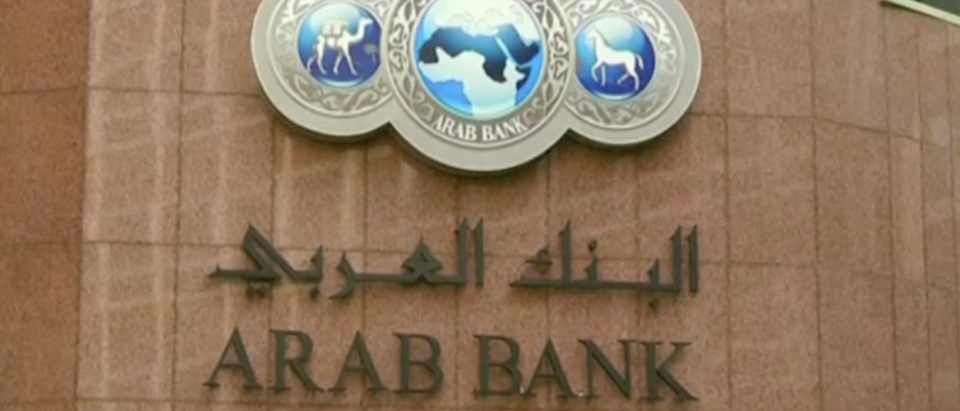Arab Bank, one of the largest financial institutions in the Middle East, provided a range of financial services to Hamas and its subsidiaries during the Second Intifada, a deadly wave of terror attacks in Israel that left 1,000 dead.
The U.S. Supreme Court will consider Wednesday whether the bank can be sued in an American court, in a case that will have wide-ranging implications for counter-terrorism efforts and international human rights law.
As an institution, Arab Bank has a rather complicated history. The plaintiffs in Wednesday’s case argue the bank’s establishment in 1930 was a focal point of anti-Zionist resistance. The founders, they say, understood “the urgent need of protecting their Arab homeland, of reinforcing their powers of resistance to colonialism and Zionism, and of assuring the Arabs of ultimate victory over those enemies.”
The bank counters that it has long since abandoned these political commitments, serving today as a development partner in the Palestinian Territories for the U.S. Agency for International Development and NGOs like Catholic Relief Services.
Beginning in 2004, Israeli victims of Hamas attacks brought suit against Arab Bank in the Eastern District of New York, seeking damages for the bank’s role in facilitating terrorist financing. The bank hosted accounts for senior Hamas officers, processed hundreds of payments to designated terrorists, and funneled money from financiers in Saudi Arabia to the families of Palestinian suicide bombers.
The suits were brought in the U.S. because the bank’s New York branch helped administer many of these services — and because the plaintiffs can collect larger damages in an American court. “[Y]ou cannot compare the amounts that could be awarded in America in torts cases to anything we know here [in Israel],” an attorney for the plaintiff’s said, according to the bank’s brief. “I am talking millions.”
The justices will not decide the merit of these claims, however. Rather, they will decide if the bank can be sued in the United States at all.
The victims brought a suit against the bank under the Alien Tort Statute (ATS), a rarely-litigated component of the Judiciary Act of 1789. The statute gives federal courts power to hear cases brought by foreign nationals for actions “committed in violation of the law of nations or a treaty of the United States.”
“For students of the Constitution and the framing era, this is a great case,” said Paul Clement, the veteran Supreme Court advocate who represents Arab Bank. “This involves the scope of a law that was included in the first Judiciary Act of 1789 — it was tucked into the first Judiciary Act, applied twice during the first ten years of the republic, and then basically forgotten about for about 170 years.
“And then, this seemingly obscure 33-word provision was rediscovered by some clever plaintiffs lawyers,” he added.
In deciding this case, the Supreme Court must determine if corporations can be sued under the ATS. The high court has never declared that corporate liability exists within the ATS.
Human rights activists warn that the ATS is a vital accountability tool, and a ruling in the bank’s favor could significantly curtain the ability of foreign nationals to hold corporate entities responsible for human rights violations.
“Today, the Alien Tort Statute gives survivors of egregious human rights abuses, wherever committed, the right to sue the perpetrators in the United States,” says the Center for Justice and Accountability, a public interest group which litigates around human rights issues.
The plaintiffs argue that corporate liability must exist within the law, since the ATS was adopted to relieve potential diplomatic strife by creating a relief mechanism for foreign nationals adversely affected by American action. In this light it would make no sense, they say, to include the actions of individuals but exclude the actions of corporations.
They further argue the text of the ATS itself provides for corporate liability. The law gives federal courts the power to hear actions from foreign nationals involving torts, or simply “wrongful actions.” When Congress adopted this term, they argue, they knew it was connected to a constellation of ideas and assumptions, among them that actions may be brought against corporations for wrongful actions.
In rebuttal, the bank warns that finding corporate liability within the ATS will “generate the precise diplomatic friction that the ATS was designed to ameliorate,” to the extent that American courts will subsequently adjudicate sensitive human rights controversies best left to ordinary diplomatic process.
They further emphasize that corporate liability does not clearly exist in the context of international law. Since ATS actions can only be brought for violations of “the law of nations,” all claims must correspond to the dictates of international law, where corporate liability does not exist.
The bank, pointing to a 2013 Supreme Court decision, also stresses that actions under the ATS must involve violations of international law which occurred within the United States. Though the bank facilitated terror financing throughout the 1990s and early 2000s, such activities were confined to offices in the Middle East. Payments to terrorists merely passed through an electronic clearing house in New York. Therefore, they say, there is no real connection to the United States in this case.
In an amicus (or “friend-of-the-court”) brief, the federal government endorsed this part of the bank’s argument. Though the government believes corporations can be sued under the ATS, they agree that the nexus to the United States in this case is rather thin.
A decision on the case, Jesner v. Arab Bank, is expected by June of next year.
Disclosure: The writer’s fiancee is employed by a firm involved in this litigation.
Send tips to kevin@dailycallernewsfoundation.org.
All content created by the Daily Caller News Foundation, an independent and nonpartisan newswire service, is available without charge to any legitimate news publisher that can provide a large audience. All republished articles must include our logo, our reporter’s byline and their DCNF affiliation. For any questions about our guidelines or partnering with us, please contact licensing@dailycallernewsfoundation.org.


